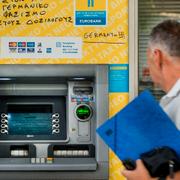Wikipedia (en)
The Greek withdrawal from the eurozone is the potential exit of Greece from the eurozone monetary union in the 2010s, primarily for the country or its government to deal with its public debt. The controversial and much discussed possible exit is often referred to in financial circles as "Grexit", a portmanteau combining the English words "Greek" and "exit". The term was coined by the Citigroup economist Ebrahim Rahbari and was introduced by Rahbari and Citigroup's Global Chief Economist Willem H. Buiter on 6 February 2012. Proponents of the proposal argue that leaving the euro and reintroducing the drachma would dramatically boost exports and tourism and encourage the local economy while discouraging expensive imports. Opponents argue that the proposal would impose excessive hardship on the Greek people, cause civil unrest, destabilize and harm the reputation of the eurozone, and could cause Greece to align more with non-EU states.
On 27 January 2015, two days after an early election of the Greek parliament, Alexis Tsipras, leader of the new Syriza ("Coalition of the Radical Left") party, formed a new government. He appointed Yanis Varoufakis as Minister of Finance, a particularly important post in view of the government debt crisis. Since then, the chance of a Grexit or even a 'Graccident' (accidental Grexit) in the near future has been widely discussed.
After the announcement of the bailout referendum on 27 June 2015 speculation rose. That day BBC News reported that "default appears inevitable", though it later removed the online statement. On 29 June 2015 it was announced that Greek banks would remain closed all week, cash withdrawals from banks would be limited to €60 per day, and international money transfers would be limited to urgent pre-approved commercial transfers.




